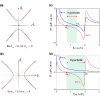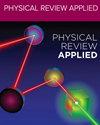Enhancing the hyperbolic bandwidth in two-dimensional materials via atomic orbital engineering
IF 4.4
2区 物理与天体物理
Q2 PHYSICS, APPLIED
引用次数: 0
Abstract
The emergence of two-dimensional (2D) hyperbolic materials, characterized by opposite-sign optical conductivities along two orthogonal axes within a specific band (known as the hyperbolic region), opens an avenue for optical device engineering. Broadening the hyperbolic region is essential for cutting-edge photonic applications. In this study, based on a correlation between the hyperbolic region and anisotropic electronic structures, we propose a strategic framework for identifying 2D natural hyperbolic materials (NHMs) with broadband hyperbolicity. Using this framework, we engineered a 2D lattice incorporating p and d orbitals, and discovered a series of 2D NHMs, MYZ (M = ; Y = ; and Z = ). These materials exhibit broadband hyperbolicity that extends from the near-infrared to the visible-light spectrum. We have confirmed the directional propagation of surface plasmon polaritons on these 2D materials based on Maxwell’s equations. Our findings pave the way for future exploration and practical deployment of 2D NHMs in advanced technological applications.

通过原子轨道工程增强二维材料的双曲带宽
二维(2D)双曲面材料的特点是在特定波段(称为双曲面区域)内沿两个正交轴具有相反的光传导性,这种材料的出现为光学设备工程开辟了一条道路。拓宽双曲区对于尖端光子应用至关重要。在本研究中,基于双曲区与各向异性电子结构之间的关联,我们提出了一种战略框架,用于识别具有宽带双曲性的二维天然双曲材料(NHM)。利用这一框架,我们设计了一个包含 p 和 d 轨道的二维晶格,并发现了一系列二维天然双曲材料 MYZ(M = Co,Pd,Ru,Rh;Y = S,Se,Te;Z = Cl,Br,I)。这些材料表现出从近红外光谱到可见光光谱的宽带双曲性。我们根据麦克斯韦方程证实了表面等离子体极化子在这些二维材料上的定向传播。我们的发现为未来探索和实际部署二维 NHMs 在先进技术应用中的应用铺平了道路。
本文章由计算机程序翻译,如有差异,请以英文原文为准。
求助全文
约1分钟内获得全文
求助全文
来源期刊

Physical Review Applied
PHYSICS, APPLIED-
CiteScore
7.80
自引率
8.70%
发文量
760
审稿时长
2.5 months
期刊介绍:
Physical Review Applied (PRApplied) publishes high-quality papers that bridge the gap between engineering and physics, and between current and future technologies. PRApplied welcomes papers from both the engineering and physics communities, in academia and industry.
PRApplied focuses on topics including:
Biophysics, bioelectronics, and biomedical engineering,
Device physics,
Electronics,
Technology to harvest, store, and transmit energy, focusing on renewable energy technologies,
Geophysics and space science,
Industrial physics,
Magnetism and spintronics,
Metamaterials,
Microfluidics,
Nonlinear dynamics and pattern formation in natural or manufactured systems,
Nanoscience and nanotechnology,
Optics, optoelectronics, photonics, and photonic devices,
Quantum information processing, both algorithms and hardware,
Soft matter physics, including granular and complex fluids and active matter.
 求助内容:
求助内容: 应助结果提醒方式:
应助结果提醒方式:


